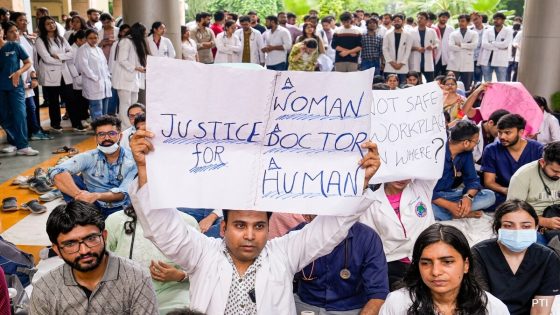This First Person column is the experience of Paulina Simon, who lives in Calgary. For more information about CBC’s First Person stories, please see the FAQ.
Standing in front of a bin, one of my first tasks at my new job at a Calgary thrift store was to navigate the odour of unknown feet. I paired and organized the dusty, “gently used” shoes people had donated over the weekend.
Worn soles, boots with fresh mud from their last hike, heels — lots of high heels that left the office to work from home during the COVID-19 era. I bent over the half-full bin and took a deep breath into people’s walks. I wondered if anyone could tell where I’ve walked by looking at my old shoes.
I am 42 and I’m starting my life again from scratch. Two years ago, I left Ecuador with my husband, two teen boys and our dog.
We fled a chaotic political situation to seek peace and better opportunities in Canada, and left behind everything we called home — including who we thought we were — and aimed to embrace our new life as immigrants.
At that point, I thought we were prepared. I was granted a work permit. My husband got accepted for a master’s degree in fine arts at the University of Calgary. We quizzed friends who had already immigrated and created sample budgets based on our savings and my husband’s scholarship.

We knew I would need a job as soon as possible, and that 20 years of experience and the book I published in Spanish counted for next to nothing.
So I renounced my professional background as a documentary filmmaker, script-writing teacher and journalist. I wrote a simple, one-page resume with the help of a career coach at the public library. Then I applied for entry-level retail jobs online and within two months, I had my first shift.
I was eager and enthusiastic, even in the backroom of a thrift store, because I was going to fill that blank page of Canadian experience.
Besides, I was amazed at how a retail business could run from only donations. I’d never heard of a businesses like this in Ecuador. We try to fix things that don’t work properly and when we have things we value but don’t use anymore, we search out friends and neighbours who might need them. That’s why it took me six months to empty my house before we moved.
Here in Calgary, I wondered at the variety of things people donate. At first, I thought they were gifts of solidarity. Then I realized donate can also be a synonym of dispose.
In addition to things with value, people dumped expired food, broken plates, ripped clothes, broken electronics, their children’s crafts, half-written journals and half-coloured mandala colouring books for stress. I guess they didn’t get any calmer after colouring the first two pages, so they just brought them to us.

In those early days, I struggled physically. My feet were swollen and I had a strong allergic reaction to dust. I felt I couldn’t breathe and had pain in almost every joint from walking 80,000 steps a week. At night, I would dream of racks full of miscellaneous products to organize. But I kept my spirits up. I was paying for our food, and that was enough.
I was also constantly finding treasures for my new house. It was as if objects had reincarnated and followed me. Like a beloved record player, the exact model of my former 35mm Pentax camera, a print of The Kiss by Gustav Klimt and the most curious one, a red blanket identical to one I left. And the tag read “Craft in the Hills of Ecuador.”
My energy declined heading into winter. I lost my last link to the old me when I finished the semester with my last class online for students in Ecuador. It was replaced with the never-ending Christmas carols and the cold transit rides, stress about money, and a lonely ache for family and friends.

But I keep going and I’m not alone. I have a strong bond with my colleagues. We speak many languages but our main words to each other are of support. We hug and tell each other: this can only get better.
I rarely talk at work about what I used to do for a living, worried it would sound pretentious. But here, where everything gets recycled, reused, resold, a lot of us are recycled as well. We’re accountants, lawyers, anesthesiologists, engineers and teachers from past lives, who are now sorting, cleaning, hanging, pricing, dusting and merchandising ad infinitum.

Sometimes I wonder if we made the right decision to leave. But maybe that is just my ego talking. Was I really a better person before because of my more intellectual work? Am I less important now because I clean and merchandise all day long?
This is where my shoes have been walking. I feel vulnerable but not fragile. I’m living, learning and experiencing a world like so many others who have left homes and identities behind. I do wonder if I will ever be a teacher again and inspire others with my work.
But for now it should be enough to be kind with the people I meet everyday and impact their day with a smile. And to be patient with myself while I figure out my next steps.
Telling your story
CBC Calgary is running in-person writing workshops to support community members telling their own stories. This story came from a workshop held in partnership with the Calgary Public Library at the Crowfoot location.
Read other personal stories below, and more about these workshops at cbc.ca/tellingyourstory.
Source Agencies


